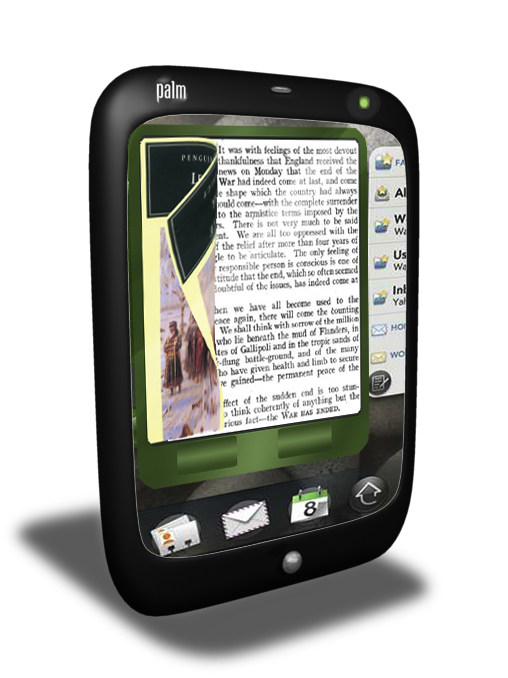The Ultimate Tablet: On Palm's webOS?

Palm's soon to be launched Pre on the Sprint mobile network will introduce the first webOS-based device into the consumer market. But should webOS be restricted to just smartphones? What about larger devices such as a tablet in the conceptual rendering above? (NetPilot Tablet Design Concept by Spidermonkey)
The Holy Grail of larger format handhelds, Apple's iTablet, is essentially "rumorware". While analysts and Apple-watchers discuss it as if it was a real product, the secretive company hasn't made a peep about any MID devices bigger than an iPod Touch or an updated iPhone coming out anytime soon and any discussion that would support the contrary is just pure wishful speculation.
Click on the "Read the rest of this entry" link below for more.
The same could be said of Microsoft, who's futuristic Windows 7 Mobile devices in MID/Tablet form are nothing but pure fantasy at this point. It also doesn't help that Microsoft's top e-Book proponent, Bill Hill, recently left the company.
Symbian is still getting it's act together as an organization for Open Sourcing its rich digital convergence platform, and while an extremely mature OS with tremendous past successes in the mobile phone market with over 100 million devices shipped worldwide from several major manufacturers, is not currently finding its way into advanced devices other than niche smart phones largely targeted towards the European and Japanese markets. If a mass-market Symbian Tablet is being developed, nobody has heard a peep about it yet.
AndResearch In Motion?They've yet to deliver anything that isn't tied to a mobile phone network. While the idea of BlackBerry OS running on a larger touchscreen MID is interesting -- as the platform already has a large stable of developers that could easily adapt existing software to a tablet format RIM device, I think that it is unlikely that a "Big BlackBerry" is ever going to be in the offing. I'd like to see one, but I doubt it.
Palm? But they haven't even shipped a single device yet! Isn't Android the more logical platform for this?
Yes, and no. While Google is making great strides with its version 1.5 Cupcake releaseof its Androidsoftware, which is Linux-based like the Palm webOS, in the end it is acting as a software company providing an Open Source platform for other companies to do the heavy lifting of marketing and device development -- a similar strategy to one that that Palm once tried with PalmSource, licensing its classic Palm OS software to companies like SONY, Samsung, Qualcomm, Symbol Technologies and TRG/Handera which produced PalmOS PDAs such as the CLIÉ and the TRGPro.
While I am sure some of those entries will be very compelling, the large Asian firms contract manufacturing and distributing Android MIDs will not likely have the sex appeal of Apple unless one of the "Big Brands" such as SONY, LG, SAMSUNG, SHARP or even VIZIO jump into the game with marketing. This is not to say that Google cannot pull off a large commercial success with a mass-market Android MID tablet, however it just makes the marketing and brand positioning somewhat complicated when Google itself doesn't actually "sell" something tangible.
On the other hand, Palm's webOS has all the DNA to be the ideal embedded OS for a mass market mid-sized touchscreen tablet device that would serve the functions of browser, PDA, media player and e-book reader. Its Mojo development platform is reputed to be very easy to create software for. And unlike Google, Palm has the most experience of developing and shipping successful handheld devices and software than any other company in existence, Apple included.
Before there ever was an iPod Touch, there were many generations of PalmPilots (although arguably Apple's ill-fated Newton, which Steve Jobs killed when he returned from his exile at NeXT preceded it by several years) and more than 10 years before a single Kindle shipped, the first ebooks appeared in AportisDoc (PRC) format on Palm handhelds. Indeed, Palm is a brand that many people used to have fan loyalty to, myself included.
In the late 90s I co-founded the New York Palm Users Group (which merged with NYCDAUG in 1999) with my friend Rachel Luxemburg and wrote extensively about the devices for PalmPower Magazine, the top online news site about the devices at the time. At the end of the 90s, Palm of course lost its founders, Donna Dubinsky and Jeff Hawkins, who went on to form HandSpringand then were later acquired by 3COM, who then brought the founders back and re-united them with Palm, and then a whole bunch of convoluted spin-off stuff happened which I'm far too impatient to detail. Suffice to say its been a long strange trip for the company, which is poised for a possible renaissance with their Pre device and webOS.
But what of a "PreTablet" or a "NetPilot"? A larger format, touchscreen, color webOS device, based on the Pre reference hardware chipset, presumably with built-in Wi-Fi, 16GB to 32GB of RAM and with an SD expansion slot? Sold in regular consumer electronics retail channels, like Best Buy and Staples? A device that could easily compete with both Kindle and the iPod Touch for attention, and if positioned correctly, would beat both Google and Apple to owning a brand new affordable tablet market segment. What should they price such a thing at? I'm thinking $300 to $400.
Would you buy a Palm webOS-based tablet device, if the price was right? Talk Back and Let Me Know.
